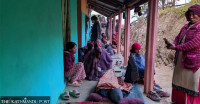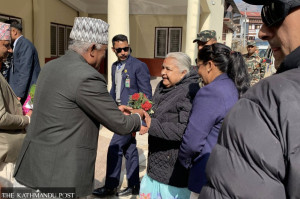Koshi Province
Women still face witchcraft charges in Sunsari
Rights activists say most of the victims of such allegations are women from marginalised communities.Sumnima Chamling
On August 1, a 50-year-old woman was assaulted by three other women who accused her of practising witchcraft.
The woman, who asked her identity to be withheld for privacy reasons, said the incident occurred at around 5 pm while she was cooking dinner at her home in Ramdhuni Municipality, Sunsari.
“Three women whom I’m distantly related to entered the kitchen, pulled me by my hair and dragged me to a temple,” said the victim. The temple is around one and a half kilometres from her house. “Nobody tried to stop them. The whole village just stood by while the women brutally beat me, accusing me of being a witch.”
The group of women accused her of using black magic to make people fall ill.
According to the victim, there was no one in the house when the incident occurred. “My son and daughter-in-law had left the house for work in the morning. The women found me alone and assaulted me,” she said.
Meanwhile, one of the perpetrators of the crime said that the group beat the 50-year-old woman after a local shaman told them that she practises witchcraft.
“The shaman told me that the woman is responsible for my husband’s declining health. He has been bedridden for the past four months,” she said.
This was not the first time the victim was manhandled and beaten for allegedly practising witchcraft. A decade ago, a similar incident took place when her neighbours got together and beat her, she said. She did not go to the police at the time since the villagers forced her to make peace with the perpetrators.
Similarly, two years ago, a woman of Inaruwa, the district headquarters of Sunsari, was accused of practising witchcraft by her neighbours. She had filed a complaint against 58-year-old Pawan Sharma of Inaruwa Ward No. 10 for beating her.
“The District Court in Sunsari put him in jail for six months,” said Binu Basnet, a sub-inspector of Women’s Cell in the District Police Office.
The woman and her family refused to talk to the Post about the incident for want of privacy.
Both women who were beaten on witchcraft allegations are from Dalit communities in Sunsari. Rights activists say most of the victims of such allegations and mistreatments are from marginalised communities, with the perpetrators of the crimes coming from a higher socio-economic background.
“Women from the impoverished communities often find themselves at the receiving end of such accusations and beatings. One of the most pressing reasons for the ill-treatment of women from these strata of society is their weak economic standing,” Shanti Gajamer, a human rights activist in Sunsari, told the Post. “Women need to be financially empowered and independent. Superstitious beliefs accepted by a large chunk of the Nepali society is another reason why women are still being accused of witchcraft in the 21st century.”
According to the District Police Office data in Sunsari, despite several such incidents occurring in most parts of the districts, including the headquarters, only 12 cases have been filed by victims of witchcraft allegations from the fiscal year 2010/11 to the fiscal year 2020/21.
That only a few cases are being filed with the police is indicative of the pressure the accusers put on the victims and their families, activists say.
“Only half of the cases are being reported to the police. Most of the witchcraft allegation incidents are hushed up and settled in the villages,” said Gajamer.
One can file a complaint of witchcraft allegation within 90 days of the incident. “However, very few witchcraft allegation cases get reported in the police stations,” said Basnet from the Women’s Cell in Sunsari Police Office.
According to Bigyan Sharma, an associate professor of Sociology in Sunsari, the fault lies with our society for turning a blind eye to such malpractices at home or in our neighbourhood. “Most of the victims of such allegations are single women and poor people. It’s time that we spread awareness on this issue,” Sharma said.
The 2015 Witchcraft Act prohibits accusations of witchcraft and stipulates a jail term of six to eight years and a fine of Rs 5,000 to Rs 100,000 to those found guilty.




 13.12°C Kathmandu
13.12°C Kathmandu













